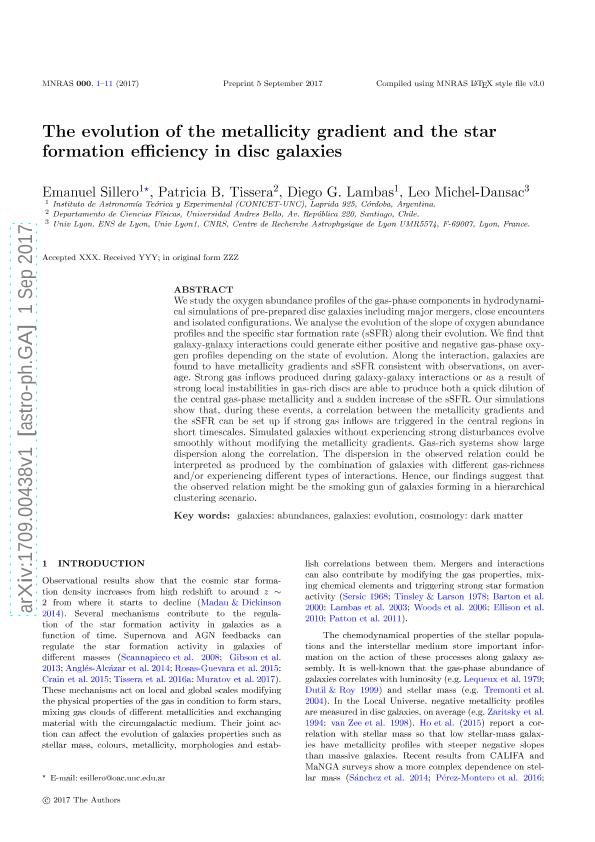Artículo
The evolution of the metallicity gradient and the star formation efficiency in disc galaxies
Sillero Ros, Guillermo Emanuel ; Tissera, Patricia Beatriz
; Tissera, Patricia Beatriz ; Garcia Lambas, Diego Rodolfo
; Garcia Lambas, Diego Rodolfo ; Michel-Dansac, Leopold Laurent Joseph
; Michel-Dansac, Leopold Laurent Joseph
 ; Tissera, Patricia Beatriz
; Tissera, Patricia Beatriz ; Garcia Lambas, Diego Rodolfo
; Garcia Lambas, Diego Rodolfo ; Michel-Dansac, Leopold Laurent Joseph
; Michel-Dansac, Leopold Laurent Joseph
Fecha de publicación:
12/2017
Editorial:
Wiley Blackwell Publishing, Inc
Revista:
Monthly Notices of the Royal Astronomical Society
ISSN:
0035-8711
Idioma:
Inglés
Tipo de recurso:
Artículo publicado
Clasificación temática:
Resumen
We study the oxygen abundance profiles of the gas-phase components in hydrodynamical simulations of pre-prepared disc galaxies including major mergers, close encounters and isolated configurations. We analyse the evolution of the slope of oxygen abundance profiles and the specific star formation rate (sSFR) along their evolution. We find that galaxy-galaxy interactions could generate either positive or negative gas-phase oxygen profiles, depending on the state of evolution. Along the interaction, galaxies are found to have metallicity gradients and sSFR consistent with observations, on average. Strong gas inflows produced during galaxy- galaxy interactions or as a result of strong local instabilities in gas-rich discs are able to produce both a quick dilution of the central gas-phase metallicity and a sudden increase of the sSFR. Our simulations show that, during these events, a correlation between the metallicity gradients and the sSFR can be set up if strong gas inflows are triggered in the central regions in short time-scales. Simulated galaxies without experiencing strong disturbances evolve smoothly without modifying the metallicity gradients. Gas-rich systems show large dispersion along the correlation. The dispersion in the observed relation could be interpreted as produced by the combination of galaxies with different gas-richness and/or experiencing different types of interactions. Hence, our findings suggest that the observed relation might be the smoking gun of galaxies forming in a hierarchical clustering scenario.
Palabras clave:
Dark Matter
,
Galaxies: Abundances
,
Galaxies: Evolution
Archivos asociados
Licencia
Identificadores
Colecciones
Articulos(IATE)
Articulos de INST.DE ASTRONOMIA TEORICA Y EXPERIMENTAL
Articulos de INST.DE ASTRONOMIA TEORICA Y EXPERIMENTAL
Citación
Sillero Ros, Guillermo Emanuel; Tissera, Patricia Beatriz; Garcia Lambas, Diego Rodolfo; Michel-Dansac, Leopold Laurent Joseph; The evolution of the metallicity gradient and the star formation efficiency in disc galaxies; Wiley Blackwell Publishing, Inc; Monthly Notices of the Royal Astronomical Society; 472; 4; 12-2017; 4404-4413
Compartir
Altmétricas



